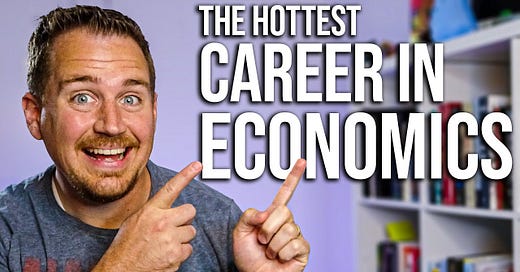It’s 2017, and I’m weeks away from finishing grad school. But I don’t have a job. One school had expressed interest, but it was under the purview of the federal government, and Trump as part of his first act as president has declared that there is a hiring freeze. I have four kids, and (almost) a PhD from one of the best schools in the world, but I don’t have a job.
So naturally I turn to Netflix. But not to watch it. I contact them and ask if they’re interested in hiring an economist. And the interview process began.
Eventually the other job came through and I stayed a professor, but for a brief moment I almost became an economist in tech. And, frankly, many times I wonder what that life would have been like. Because some of the most exciting work in economics is taking place in tech companies, and I regularly tell students they should position themselves for a job there. You can learn more about economists at tech companies in the Journal of Economic Perspectives (remember, it’s an underrated resource!).
Well, if you’re interested in this kind of job, I have good news for you. Today’s video not only covers why I think tech economics is exciting, it points you to a new opportunity to break into that career. ScholarSite, a new online-education company, is starting a course on the economics of digital platforms with the opportunity to network with others in the field.
I was so excited about this course that I reached out and asked for a discount for the Market Power community. They agreed, and as far as I know I’m the only one with access to a discount! So if you enter MARKETPOWER10 under Promo Code when you register, you can get 10% off the registration fee.
Space is limited in the class, so if you’re interested you should register as soon as possible. But even if you’re unsure, you should put your name down on the waiting list and they can notify you when a new course comes.
Click this Link and use code MARKETPOWER10 for 10% off
The Puzzle of Olympic Swimming
We’ve been watching the Olympics all week, and of course the prime-time event has been swimming. Although we no long have Michael Phelps dominating every event, it was exciting to cheer for Katie Ledecky in her different events. But as an economist, something bothered me.
How do star swimmers manage to be good at every event? In the 2016 Olympics, Ledecky won gold in the 200m freestyle. Although she came in 5th this year, she won gold in both the 800m and 1500m freestyle.
This was strange to me because I ran track in high school, and I know that a 200m sprinter looks nothing like a 1500m runner. A sprinter looks like Captain America while a long-distance runner looks like Steve Rogers before he got the super soldier serum. Just look at this year: yesterday Marcell Jacobs won the 100m dash, and he’s 6’2” (1.88 m) and 174 lbs (79 kg); the favorite to win the 1500m is Matt Centrowitz, who is 5’9” (175 cm) and 133 lbs (60 kg). Those are very different body types!
So why can the same swimmer succeed in so many events?
My guess is barriers to entry. To start running, you need no equipment. You don’t even need shoes. Since there are no barriers to entry, everyone in the world has the opportunity to become a runner.
But for swimming, you need a pool. And to become a good swimmer, a backyard pool isn’t enough. You need an Olympic-sized pool. How hard are those to find? Some athletes see a pool that size for the first time when they get to the Olympics.
That’s a huge barrier to entry. It restricts who can participate, which means there’s less competition. Thus, a fast swimmer finds that she can succeed in multiple strokes and distances, but a fast runner finds that he has to focus on a few events.
This is why body types look so different in track events. When there’s more competition, there are greater rewards to specializing. Specialization goes to your comparative advantage, and comparative advantage in athletics is highly influenced by your physical stature.
So why am I asking if economics ruins the Olympics? Well, it just makes me wonder how much faster the swimming events would be if we could get rid of the barriers to entry and see more specialization.




